|
|
|
Sort Order |
|
|
|
Items / Page
|
|
|
|
|
|
|
| Srl | Item |
| 1 |
ID:
141953
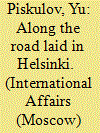

|
|
|
|
|
| Summary/Abstract |
THIS WAS THE TITLE of the collection of documents and materials related to the Final Act of the Conference on Security and Co-operation in Europe (CSCE) (Helsinki 1975) published in Moscow in 1980. The conference was initiated by the Soviet Union and Finland and attended by 35 European states as well as the United States and Canada.* The West-Russia confrontation of our days and the Ukrainian developments added significance to this unprecedented event in the history of the West-West relationship (Helsinki being deliberately chosen as its venue) and rekindled an interest in it among the political, business and academic communities all over the world.
|
|
|
|
|
|
|
|
|
|
|
|
|
|
|
|
| 2 |
ID:
141950
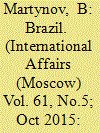

|
|
|
|
|
| Summary/Abstract |
WITH THE DEADLINE of the BRICS Summit in Ufa, Bashkortostan, Russia, drawing near, it is logical to expect heightened interest in Brazil, Russia's strategic partner and its partner in BRICS and the Group of Twenty (G20). Brazil is far away at the other end of the world, yet it shares this country's approaches to major global problems, has nearly equal GDP and several other economic figures, and, no less important, possesses similar national emotional and psychological mindsets.
|
|
|
|
|
|
|
|
|
|
|
|
|
|
|
|
| 3 |
ID:
141948


|
|
|
|
|
| Summary/Abstract |
TODAY, the old conflict between political and economic structures of the West and the East is unfolding against the background of another global crisis. The countries and business structures of the "golden billion" have not relieved their economic pressure on the developing countries. The globalizers do not hesitate to pile political responsibility for regional tensions on the powers that the First World finds unpalatable. Something similar is going on in the information field.
|
|
|
|
|
|
|
|
|
|
|
|
|
|
|
|
| 4 |
ID:
141952
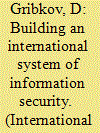

|
|
|
|
|
| Summary/Abstract |
INFORMATION SECURITY is one of the top issues on today's global agenda. Awareness of growing threats in information space and of their potential effects prompts the need for a systemic search for solutions to information security problems.
|
|
|
|
|
|
|
|
|
|
|
|
|
|
|
|
| 5 |
ID:
141943


|
|
|
|
|
| Summary/Abstract |
THE COMMONWEALTH of Independent States (CIS), a surprise substitute for the former Soviet Union that was born at the 1991 Belaya Vezha meeting of the then leaders of Russia, Belarus and Ukraine but had its important details poorly thought out by them, right from its inception has had great difficulties to struggle with to survive as a strategic union of countries. The CIS was effectively the product of a serious crisis that culminated in the collapse of the Soviet Union, and it still embodies less-than-stable development processes in the vast expanse of Eurasia.
|
|
|
|
|
|
|
|
|
|
|
|
|
|
|
|
| 6 |
ID:
141946
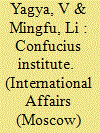

|
|
|
|
|
| Summary/Abstract |
IN THE TWENTY-FIRST CENTURY, the outlines of international relations have changed to a great extent and continue changing under the impact, in particular, of "soft power" that different countries apply to achieve their aims on the world scene. Having learned that its interests in the world community cannot be protected by military might alone, Beijing turned to "soft power"; today, it is used on a grand scale.
|
|
|
|
|
|
|
|
|
|
|
|
|
|
|
|
| 7 |
ID:
141937
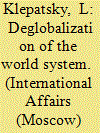

|
|
|
|
|
| Summary/Abstract |
THE PRESENT transitory post-bipolar world system manifests several trends: globalization, transformation of international relations, gradual shift toward a multipolar world and the emergence of new centers of a future world order. These and other trends of the transitory period have been exhaustively described in academic and political writings. The sum-total of factors responsible for the essence and the far from simple nature of current transformations require further specification and even more comprehensive analysis. The polycentric nature of international relations is not a recent phenomenon yet the present stage of its development goes to the depths where the so far practically indiscernible elements of a future world order are taking shape. The transitory period of the post-bipolar world has not yet ended. The theory of international relations has no use for the "transitory period" category and its highly specific historical content: Indeed, the bipolar world system took some time to develop after 1945. The transitory period is characterized by an intertwining of old and new elements and factors that, on the one hand, ensures continuity of international relations and, on the other, creates the outlines (configuration) of a new world order.
|
|
|
|
|
|
|
|
|
|
|
|
|
|
|
|
| 8 |
ID:
141939


|
|
|
|
|
| Summary/Abstract |
BY THE EARLY TWENTY-FIRST CENTURY, the United States and China found themselves strategically and economically interconnected at the global level with elements of military-political rivalry. Chinese diplomacy carefully avoided direct confrontation with America on the world arena,1 that probably meant that Beijing was biding its time to multiply its political might (very much in line with Deng Xiaoping's taoguang yanghui tactics - "conceal our capabilities, avoid the limelight"). Much of what China is doing - building up its military budget, undertaking military modernization, seeking access to natural resources outside its territory, etc. - was interpreted as a movement in this direction.
|
|
|
|
|
|
|
|
|
|
|
|
|
|
|
|
| 9 |
ID:
141954
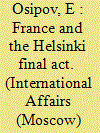

|
|
|
| 10 |
ID:
141940
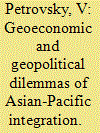

|
|
|
|
|
| Summary/Abstract |
ECONOMIC INTEGRATION in the APR has come close to fundamental qualitative changes launched by the emerging mechanisms of multi-sided integration in trade and economies. In November 2014, in Beijing the APEC summit discussed a future Free Trade Area of the Asia-Pacific (FTAAP), a Regional Comprehensive Economic Partnership (RCEP) on the basis of ASEAN and its partners, and a Trans-Pacific Partnership (TPP) lobbied by the U.S.
|
|
|
|
|
|
|
|
|
|
|
|
|
|
|
|
| 11 |
ID:
141938
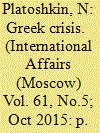

|
|
|
|
|
| Summary/Abstract |
LAZY like all other South Europeans, Greeks have been living beyond the means for many years. This is what the core EU countries (Germany in the first place) and the United States think about the roots and causes of the grave economic crisis in Greece. This answers the first question. The answer to the second has been already supplied by the so-called friends of Greece from among the EU members and the notorious "masters of disasters" of the IMF: The Greeks should trim social spending, tighten their belts and wait for the light at the end of the tunnel.
|
|
|
|
|
|
|
|
|
|
|
|
|
|
|
|
| 12 |
ID:
141957
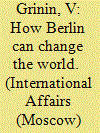

|
|
|
| 13 |
ID:
141958


|
|
|
| 14 |
ID:
141941
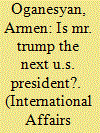

|
|
|
|
|
| Summary/Abstract |
"THE AMERICAN DREAM is dead, but I will bring it back" is the slogan with which Donald Trump literally burst into the presidential election race. The billionaire who made his fortune through real estate development and sales has seriously scared both the Democratic camp and some of his fellow party members, the Republicans. Despite all the attempts to marginalize him, Trump is confidently winning support and building up an electorate for himself.
|
|
|
|
|
|
|
|
|
|
|
|
|
|
|
|
| 15 |
ID:
141936
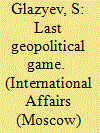

|
|
|
|
|
| Summary/Abstract |
CONTRARY TO THE PREDICTIONS made by Washington advocates,1 the disintegration of the USSR and the world socialist system did not lead to the end of history. Neither socialism nor the crisis of capitalism has disappeared. Granted, the first has acquired Chinese specifics and integrated the mechanisms of market self-organization, producing a new type of social and economic relations, which half a century ago Pitirim Sorokin prophetically described as an integral order. The second, having assumed the appearance of a global financial crisis, acquired a global scale. However, just as the Great Depression of the 1930s, it did not hurt socialist economies, which, in addition to China, should also include Vietnam, Cuba and, to a certain extent, India and North Korea, which has preserved its uniqueness. On the other hand, as the Soviet Union used the Great Depression in capitalist countries for socialist industrialization purposes, China, by mastering a wide range of Western technology, in response to the global crisis, focused on ensuring the rise of the domestic market.
|
|
|
|
|
|
|
|
|
|
|
|
|
|
|
|
| 16 |
ID:
141935
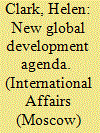

|
|
|
|
|
| Summary/Abstract |
IN THE COMING MONTHS in New York, United Nations member states are expected to agree on a new development agenda which will replace that of the Millennium Development Goals (MDGs). It is shaping up to be an ambitious and transformational development agenda, which would be universal in nature, cover all three dimensions of sustainable development, and aim to address the many interlinked challenges our world is facing. The agenda is relevant to countries at all stages of development.
|
|
|
|
|
|
|
|
|
|
|
|
|
|
|
|
| 17 |
ID:
141949


|
|
|
|
|
| Summary/Abstract |
SOUTH AFRICA is today not only the leader in its region but also a significant player in the international arena. The country has a distinctive history abounding in events and facts that have evoked reaction all over the world. Russian-South African relations and the former Soviet Union's influence on developments in South Africa, and in the south of the African continent in general, deserve a careful study and indisputably arouse interest among scholars and analysts. But despite the long history of South Africa's relations with the Soviet Union and post-Soviet Russia, much less is going on now between our countries than one would have expected.
|
|
|
|
|
|
|
|
|
|
|
|
|
|
|
|
| 18 |
ID:
141947
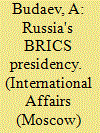

|
|
|
|
|
| Summary/Abstract |
THE IMPORTANCE of "soft power" politics, which, in conjunction with traditional diplomatic tools, enables the principal actors of international relations to ensure their national interests in a more effective way and on a long-term basis, objectively increases at the current transitional stage in world development, which is characterized by the exacerbation of a number of disagreements and problems, the escalation of conflicts and a lower level of predictability. More states, which are laying claim to global leadership, including Russia and other BRICS countries, use "soft power" in their political strategies to create a favorable external environment for internal development and address practical issues related to modernization and the expansion of the area of their influence.
|
|
|
|
|
|
|
|
|
|
|
|
|
|
|
|
| 19 |
ID:
141956


|
|
|
| 20 |
ID:
141945
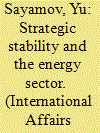

|
|
|
|
|
| Summary/Abstract |
WHEN WE THINK about the world of today, unfortunately, we have to recognize that the so-called end of the Cold War has made it neither more stable nor more secure. The bipolar geopolitical system, which had for nearly half a century kept the world away from a new global confrontation and which disappeared together with the Soviet Union, has still not found a replacement. Far from being formed, a new system of international relations has not even emerged in general outline. It seems that the U.S.-led unipolar model is unacceptable to anyone but the U.S. In any case, there are no indications that other states, even its closest allies, are ready to accept an official status as a vassal to the only superpower that has remained from the former bipolar world order.
|
|
|
|
|
|
|
|
|
|
|
|
|
|
|
|
|
|
|
|
|